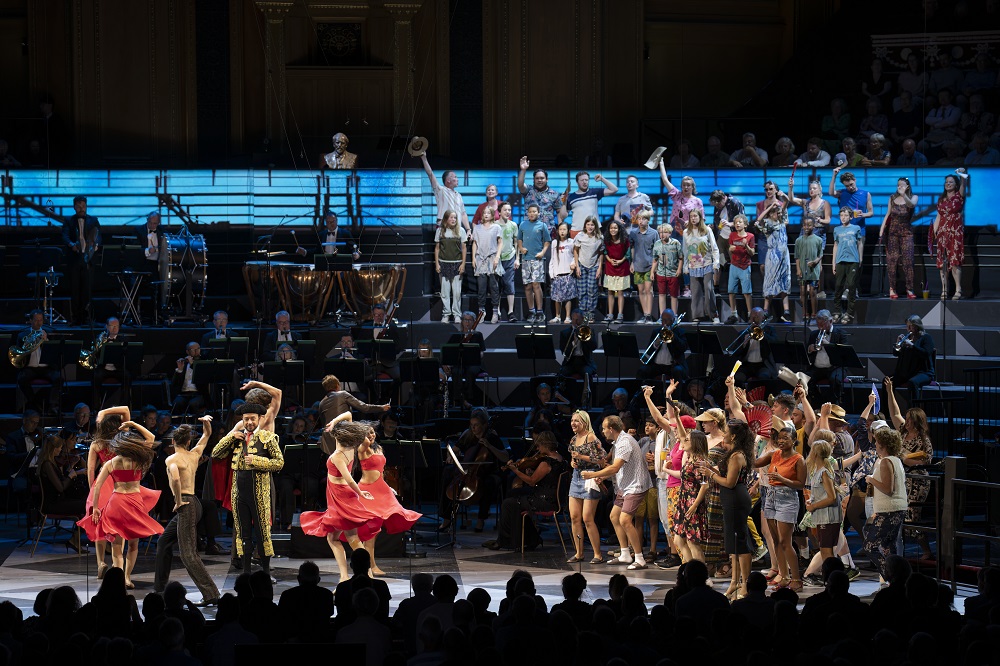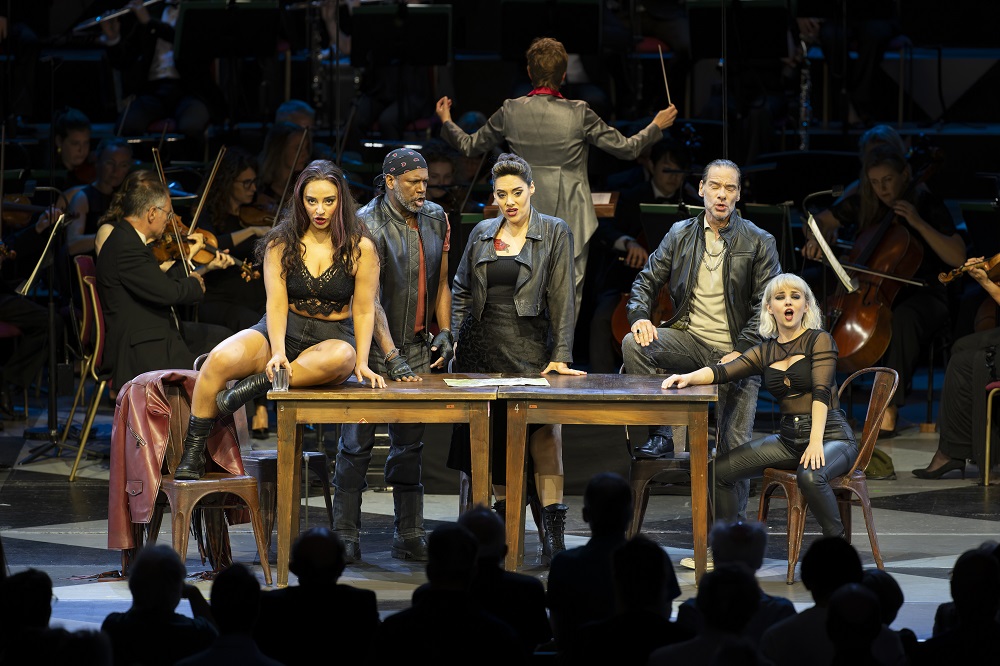If you ever doubted that Bizet’s Carmen, 150 years young next year, is one of the greatest operas of all time, this performance would have changed your mind. Among the four principals only Rihab Chaieb’s utterly convincing, consistent protagonist was the same as on first night 22 performances ago, and as ringleader we had the vivacious conductor of the second run, Anja Bihlmaier.
It was Glyndebourne music director Robin Ticciati who launched the latest Glyndebourne Carmen, and Bihlmaier seemed to share much of his fast-moving panache. But she also had her own way with some of the surprising tendresses, in league with a Don José (Evan LeRoy Johnson) who fought sensitively against director Diane Paulus's unsubtle hammering of brute male fantasies. If anything the London Philharmonic Orchestra was making even more ravishing sounds in a masterscore, the 10 main roles were all superbly well cast, and the youthful Glyndebourne Chorus sounded more lustrous than ever in this space, tenors especially. A big shout of joy, too, for the kids. (Ensemble pictured below in Act Four, with Łukasz Goliński's Escamillo flanked by dancers).  Paulus's production may not have been the most subtle at Glyndebourne, but it told the story, and Adam Torrance's adaptation, more than a concert semi-staging, made it work in the vast colosseum better than a concept like Andreas Homoki's for the Opéra Comique, seen at the Edinburgh Festival earlier this month, would have done. Some miking - I'm not sure how much, mostly, I assume, for the French spoken dialogue - was in order, but everyone knew how to pull focus, from the first scene of soldiers harrassing some passers-by to a horribly convincing final murder (strangulation by necktie). We found ourselves in resonant hands from the start with Thomas Mole's Moralès (also from the second cast), Dingle Yandell's Zuniga and Janai Brugger's perfectly modulated Micaela. Her duet with fellow villager José, which can drag once we've been introduced to the sexy star of the show, brought tears to the eyes, especially when Bihlmaier adapted the tempo to give space to José's "Ma mère, je la vois".
Paulus's production may not have been the most subtle at Glyndebourne, but it told the story, and Adam Torrance's adaptation, more than a concert semi-staging, made it work in the vast colosseum better than a concept like Andreas Homoki's for the Opéra Comique, seen at the Edinburgh Festival earlier this month, would have done. Some miking - I'm not sure how much, mostly, I assume, for the French spoken dialogue - was in order, but everyone knew how to pull focus, from the first scene of soldiers harrassing some passers-by to a horribly convincing final murder (strangulation by necktie). We found ourselves in resonant hands from the start with Thomas Mole's Moralès (also from the second cast), Dingle Yandell's Zuniga and Janai Brugger's perfectly modulated Micaela. Her duet with fellow villager José, which can drag once we've been introduced to the sexy star of the show, brought tears to the eyes, especially when Bihlmaier adapted the tempo to give space to José's "Ma mère, je la vois".
Chaieb's great achievement, as before, was to make everything Carmen does, sings and says natural and believable: lines you wouldn't normally expect to find funny met with considerable laughter from the 5,500 plus audience. The Séguidille was a miracle of gentle seduction thanks equally to Fiona Kelly's flute, Carmen's feline daemon at this point. Not every vibrant mezzo Carmen can nail the frills in the refrains of the "Danse Bohème" so accurately, and by then, at the start of Act Two, we were in Bar Albert Hall, rainbow lights all round the auditorium playing their part. Jasmin Vardimon's choreography was never the most accomplished,the dancers always visibly separated from the singers, and might have been dropped during Bihlmaier's brilliant handling of the last Entr'acte, but it was good to see it made possible in this context.  This Escamillo, Łukasz Goliński, didn't try to compete with his predecessor at Glyndebourne, Dmitry Cheblykov, for muscle display, but had all the range and nuance necessary (if somewhat modified French at times). The Quintet in which the smugglers try to persuade Carmen to join their venture is difficult enough to make perfectly light and crisp with close co-ordination between conductor and stage (Bihlmaier was keeping a close watch behind the singers, but they could just about see her if they looked on two biggish screens at the back of the hall. Surtitles, not always a given at the Proms, were very welcome, too). Here it was perfection: kudos to Loïc Félix, François Piolino, Carmen-in-waiting Kezia Bienek and audience favourite (deservedly, for her esprit and considerable heft) Elisabeth Boudreault (all pictured above with Chaieb left).
This Escamillo, Łukasz Goliński, didn't try to compete with his predecessor at Glyndebourne, Dmitry Cheblykov, for muscle display, but had all the range and nuance necessary (if somewhat modified French at times). The Quintet in which the smugglers try to persuade Carmen to join their venture is difficult enough to make perfectly light and crisp with close co-ordination between conductor and stage (Bihlmaier was keeping a close watch behind the singers, but they could just about see her if they looked on two biggish screens at the back of the hall. Surtitles, not always a given at the Proms, were very welcome, too). Here it was perfection: kudos to Loïc Félix, François Piolino, Carmen-in-waiting Kezia Bienek and audience favourite (deservedly, for her esprit and considerable heft) Elisabeth Boudreault (all pictured above with Chaieb left).
Then we were in to the pure music-theatre of Carmen and José alone together. Johnson may not have the most refined top range, but that and his big build were appropriate for José's darker nature, and again tender collaboration with Bihlmaier and the orchestra in the Flower Song proved spellbinding (yes, the top B flat was sung pianissimo as it usually is these days).
So it was clear that we had a battle of sensuous freedom and fatal male violence which was going to last us well through to the end. You really felt at the beginning of the final confrontation as if there was no way Jose was going to kill the woman he hopelessly loved; Bizet, Chaieb, Johnson, Bihlmaier, orchestra and chorus kept it real to the shocking last. Anyone left unimpressed would have to possess a heart of stone.














Add comment